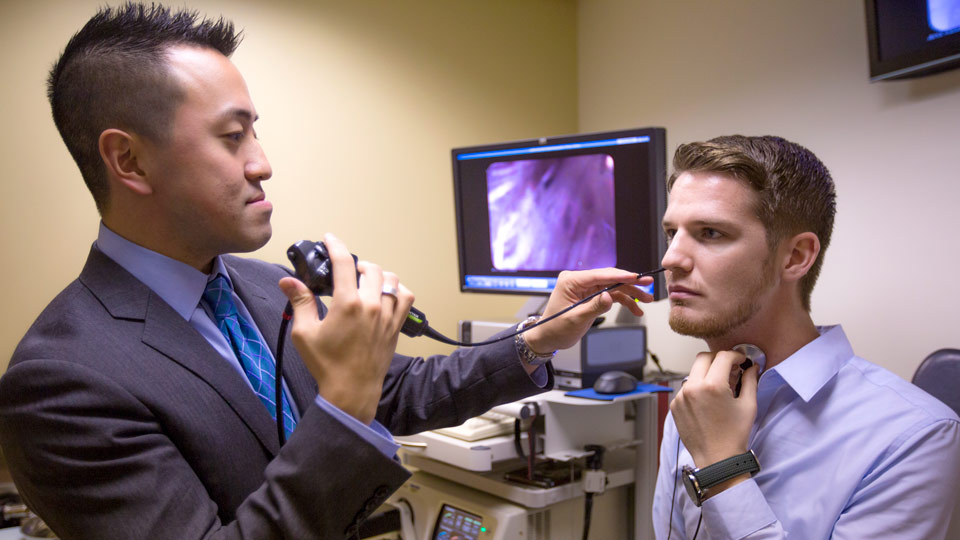When It's Time to See a Voice ENT
When It's Time to See a Voice ENT
Blog Article
Exploring the Area of Otolaryngology: What to Anticipate When You Consult an ENT
Otolaryngology, typically referred to as ENT, incorporates the medical diagnosis and treatment of ear, throat, and nose disorders. For those experiencing relevant issues, speaking with an ENT professional can supply clarity and alleviation. Understanding what to expect during such assessments is essential for reliable communication and treatment. This introduction will outline essential facets of the ENT experience, consisting of typical reasons for brows through and the processes associated with diagnosis and treatment.

Comprehending Otolaryngology: A Summary
Otolaryngology, frequently described as ENT (Throat, ear, and nose) medicine, is a specialized branch of medication that focuses on the medical diagnosis and treatment of problems influencing these critical locations of the body. This field encompasses a large range of disorders, consisting of those relevant to hearing, equilibrium, breathing function, and speech. Otolaryngologists are educated to manage both surgical and clinical therapies, utilizing innovative techniques and innovations. Their proficiency expands beyond conventional disorders, dealing with problems such as allergic reactions, sinus infections, and hearing loss. Furthermore, they play a crucial duty in the monitoring of head and neck cancers cells, supplying extensive treatment customized to individual patient needs. Overall, otolaryngology continues to be important for preserving health and lifestyle in afflicted individuals.
Typical Factors to See an ENT Expert
Lots of individuals seek the expertise of an ENT professional for a range of reasons, showing the varied nature of conditions that affect the nose, ear, and throat. Common concerns consist of chronic sinus problems, which commonly causes persistent nasal blockage and facial discomfort. Allergies and their associated signs, such as sneezing and itching, additionally trigger sees to these experts (Otolaryngologist). Hearing loss, whether gradual or abrupt, is one more significant reason for consultation. On top of that, individuals may look for analysis for throat disorders, consisting of relentless hoarseness or swallowing troubles. Rest apnea, identified by disturbed breathing during sleep, is often resolved by ENT specialists. Each of these conditions highlights the value of specialized treatment in managing complicated ENT-related health and wellness concerns
Getting ready for Your ENT Visit
When preparing for an ENT consultation, it is necessary to gather pertinent details and take into consideration any particular problems. People need to compile a comprehensive medical history, including previous ear, nose, or throat problems, surgical treatments, and existing medications. Documenting signs-- such as frequency, seriousness, and duration-- can provide important insights for the ENT expert. Furthermore, individuals should prepare a checklist of questions they wish to ask, guaranteeing that all concerns are attended to throughout the visit. Bringing along any kind of pertinent medical documents or test results can even more assist the ENT in understanding the patient's problem. People need to confirm their consultation details, including day, time, and place, to minimize any type of last-minute confusion. Appropriate preparation can boost the effectiveness of the appointment and result in better results.
What to Anticipate Throughout the Appointment
As the examination begins, the client can expect to take part in a thorough conversation with the ENT expert concerning their signs and symptoms and medical background. The specialist will certainly inquire regarding the period, frequency, and extent of signs and symptoms such as hearing loss, nasal blockage, or aching throat. Additionally, the individual's previous medical problems, medications, and any type of relevant household background will be examined, aiding the expert in creating a complete understanding of the client's wellness. The ENT may likewise inquire about way of living factors, such as direct exposure to toxic irritants or irritants. This open discussion establishes a foundation for the examination, ensuring that the patient's issues are attended to and establishing the stage for any essential analyses or referrals for treatment.
Analysis Examinations and Treatments in Otolaryngology
An array of diagnostic tests and treatments are essential in otolaryngology to properly evaluate and diagnose conditions influencing the throat, nose, and ear. Typical tests consist of audiometry, which measures hearing function, and tympanometry, examining center ear stress. Nasal endoscopy enables visualization of the nasal flows and sinuses, while laryngoscopy examines the throat and vocal cables. Imaging techniques, such as Full Article CT scans and MRIs, provide detailed sights of head and neck frameworks. Allergic reaction screening might likewise be performed to recognize triggers for sinus or respiratory concerns. These diagnostic tools enable ENT professionals to create a thorough understanding of patients' problems, making certain customized and efficient monitoring strategies. Appropriate diagnosis is vital for successful treatment outcomes in otolaryngology.
Therapy Choices Supplied by ENT Specialists
ENT specialists use a selection of treatment options tailored to deal with particular problems influencing the ear, throat, and nose. These therapies vary from conventional strategies, such as medicine and way of life adjustments, to even more intrusive procedures. For example, allergies might be managed with antihistamines or immunotherapy, while persistent sinusitis could call for nasal corticosteroids or sinus surgical treatment. For hearing loss, ENT professionals often advise listening device or surgical interventions like cochlear implants. In instances of throat conditions, options can consist of speech therapy or procedures to get rid of blockages. Additionally, they might give guidance for handling rest apnea, consisting of the use of Continued CPAP devices or medical interventions. In general, the objective is to boost patients' high quality of life via personalized care and effective treatment strategies.
When to Look For Follow-Up Care With an ENT
Identifying when to seek follow-up treatment with an ENT expert is vital for handling continuous symptoms or problems connected to throat, nose, and ear conditions. People should consider scheduling a follow-up consultation if signs and symptoms persist despite initial treatment, such as chronic ear pain, nasal congestion, or throat discomfort. Changes in hearing, balance concerns, or uncommon nasal discharge may also require further evaluation. Additionally, if a patient experiences negative effects from prescribed drugs or has actually gone through a medical treatment, follow-up treatment is crucial to keep an eye on healing and deal with any type of issues. Timely assessments can ensure efficient management of conditions, stop prospective issues, and provide assurance relating to one's health. Looking for follow-up treatment promotes proactive health management in otolaryngology.
Frequently Asked Inquiries

What Credentials Should I Try to find in an ENT Specialist?
When looking for an ENT specialist, one must look for board accreditation, pertinent experience, and solid client testimonials. Additionally, efficient interaction abilities and a compassionate method can considerably boost the overall treatment experience.
How Do I Choose the Right ENT for My Requirements?
Selecting the appropriate ENT professional involves assessing their certifications, experience, and individual testimonials (ENT Doctor). It is necessary to contemplate their communication style and method to treatment, ensuring they align with the individual's particular health and wellness requirements and choices
Exist Any Type Of Dangers Connected With ENT Procedures?
The risks associated with ENT treatments might consist of infection, bleeding, anesthesia problems, and potential damage to bordering frameworks. Clients need to review these threats with their medical professional to recognize specific concerns and warranty educated choices.
How Can I Handle Anxiousness Prior To My ENT Visit?
To handle anxiousness prior to a visit, people can exercise deep breathing exercises, visualize favorable results, prepare concerns in advancement, and seek support from buddies or family, fostering a sense of reassurance and peace.
What Should I Do if I Experience Side Impacts From Treatment?
If negative effects from therapy happen, the individual must quickly report them to their doctor. Adjustments to therapy or extra treatments may be necessary to assure safety and efficiency in managing their condition - ENT surgery. As the consultation starts, the person can expect to involve in a comprehensive discussion with the ENT find specialist about their signs and medical background. These diagnostic tools make it possible for ENT experts to develop a thorough understanding of people' conditions, making certain tailored and reliable management strategies. ENT specialists use a variety of treatment alternatives tailored to deal with details conditions impacting the nose, ear, and throat. When looking for an ENT specialist, one should look for board accreditation, appropriate experience, and solid person reviews. Choosing the ideal ENT professional involves assessing their credentials, experience, and person testimonials
Report this page